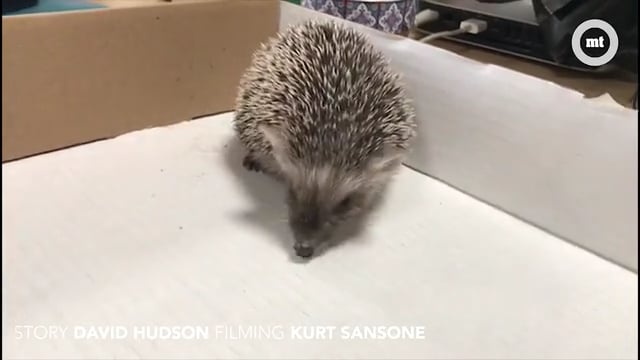[WATCH] Female hedgehog rescued by MaltaToday
A baby hedgehog rescued in San Gwann by a MaltaToday journalist will be returned to the wild by Nature Trust


A hedgehog luckily spotted and rescued by MaltaToday will be rehabilitated by Nature Trust volunteers until it's time to return to the wild.
At around noon, we spotted a tiny ball of spines just outside our San Gwann office. The first thought was that this was a hedgehog (qanfud), quite a rare sight these days. The second thought was that this little animal would not survive on the road.
We picked her up and put her in a small box in our office. She was timid at first, refusing to retract from the ball that she had turned into. Within ten minutes though, she was leaping out of the box and we had to switch to a larger container. She kept scratching at the sides until Nature Trust Malta showed up a few minutes later to take her to better pastures than our small and stressful office environment.
This species of hedgehog is one in 17 and is known as the Algerian hedgehog, found in Malta, Gozo, Algeria, Morocco, Tunisia, Libya, Spain and France. Its life expectancy is around three to four years.
In Malta, the qanfud is a protected species. It was close to getting a near threatened status in 1993 before legislation made sure it’s safeguarded in the wildlife. This means that keeping a hedgehog as a pet is out of the question.

If you encounter a hedgehog in an urban environment, your best bet is to call Nature Trust Malta—it’s advised not to feed the hedgehog and wait for the wildlife rescue team to take it and rehabilitate it.
A Nature Trust volunteer, Angelique Lofaro, who took the MaltaToday hedgehog told us that the one we had rescued was still a little hoglet and that it was a girl, weighing no more than 158grams.
“It would take two to three weeks of rehabilitation to make sure that she has trained its defensive mechanism and has the ability to eat snails on its own,” the volunteer said, adding that the hedgehog was attracted by dry food left out for cats.
Hedgehogs travel great distances in the nighttime and might end up in urban environments, likely to get run over or too far from sustenance to survive.
When Lofaro took the little one home, the hedgegog ate some fruit and vegetables and was ready to move into a clean and spacious enclosure. Lofaro described her as one of the most beautiful specimens she'd ever had.
The Wildlife Rescue Team’s 24/7 contact number is: 99999505.



.png)



















